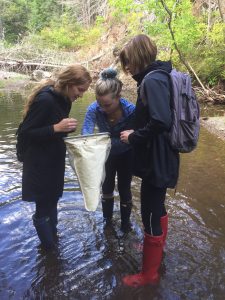Current Courses
Cell Biology (Biol 2230)
“The eukaryotic cell is evolution’s major achievement: multicellular life is merely a crude elaboration.”
-Simon Conway Morris
This course explores how eukaryotic cells function at the molecular, biochemical, and subcellular levels as well as how cells can work together to form multicellular organisms. Emphasis is placed on the dynamic and interconnected nature of cellular events. Techniques and methodological approaches to studying cells will also be discussed and some of these will be demonstrated in the lab. The relevance of cell biology to medical research and human health and disease are also considered.
Comparative Physiology (Biol 3250/3251)
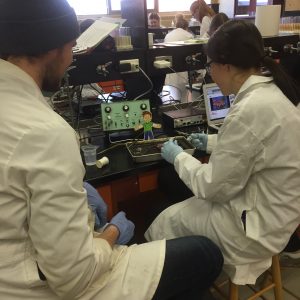 This courses take an integrative and comparative approach to explore the various vertebrate physiological systems, how they interact with each other and how they respond to the demands of a changing environment.
This courses take an integrative and comparative approach to explore the various vertebrate physiological systems, how they interact with each other and how they respond to the demands of a changing environment.
Bioethics (Biol 4372)
- I designed and developed this course for Bishop’s University (Biol 442b) and currently teach it at Lakehead University.
This course explores ethical aspects of modern biology, biotechnology, and medicine. The first part of the course provides an introduction to basic ethics principles and approaches to building sound ethical arguments. In the second part, these are applied while considering the ethical implications of various aspects of the biomedical sciences. Topics discussed include: use and abuse of biology, transgenics and the changing world, medical science today, biology and culture, sociobiology, limits to scientific inquiry. The animal rights controversy, cloning controversy, gene patenting controversy, environmental issues, and medical ethics will be also be explored.
Circadian Biology (Biol 481)
“La sensitive sent donc le soleil sans le voir en aucune manière.”
— Jean -Jacques Dortous de Mairan (1729)
“A rose is not necessarily and unqualifiedly a rose… it is a very different biochemical system at noon and at midnight.”
— Colin Pittendrigh (1965)
- I designed and developed this course based on an earlier version taught at York University (Toronto). I have taught it at StFX University and currently teach this course at York.
Circadian rhythms are ubiquitous in biology and their importance was recognized by the 2017 Nobel Prize in Physiology and Medicine. This course examines these endogenous 24h rhythms and how they coordinate physiology and behaviour. The course explores the molecular and cellular mechanisms employed by ‘clock’ cells to generate these rhythms, how timing information is distributed by nerves and hormones, and how the circadian timing system is organized in various model organisms and in humans. Molecular clocks are now known in nearly all human tissues; new research reveals their importance in synchronizing the functions of various tissues with each other, to produce coordinated functioning of the various body parts. The course will emphasize the physiological mechanisms underlying biological clocks but will also discuss the subject at the level of its cellular and molecular mechanisms and its human and medical implications.
This course uses a comparative and evolutionary framework to explore circadian rhythms and the biological clocks that generate them. Since circadian rhythms are present at every level of biological organization, this course brings together and connects information and concepts from various courses including biochemistry, molecular biology, cell biology, physiology, animal behaviour, evolution, and ecology. The importance of the circadian system for human health and disease is explored.
Human Anatomy and Physiology (Biol 251/252) – Online
“Anatomy is to physiology as geography is to history; it describes the theatre of events.”
— Jean François Fernel
De Naturali Parte Medicinae Libri Septem (1542)
- I designed and developed the online version of these courses, including the one week on-campus labs. I teach these courses at StFX University.
These courses explore the fundamentals of the structure and function of the human body. Biology 251 surveys the organization of the human body, the systems involved in support and movement, and the systems involved in integration and coordination. Biology 252 concentrates on systems involved in the maintenance of the body and reproduction.
Previous Courses
Introductory Cell/Molecular Biology (Biol 111 – Health section)
- I designed and developed the Health-focused version of this course for StFX University’s new Interdisciplinary Health Program.
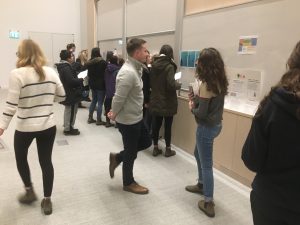 This large introductory course deals with the world of cell and molecular biology. It starts by considering the molecules that make up our cells and do the work that goes on inside them. It then explores the basic structure of the eukaryotic cell and the specialized structures that are found within them, and considers how they gather energy and convert it into a useable form. These topics comprise the “Cell Biology” component of the course. The “Molecular Biology and Genetics” component of the course describes the behaviour of chromosomes in somatic and reproductive cells, and correlates that with basic notions of heredity, including Mendelian genetics. It investigates the molecular nature of the hereditary molecules, from the structure and replication of DNA to the systems by which the genetic information is translated into functional molecules such as proteins.
This large introductory course deals with the world of cell and molecular biology. It starts by considering the molecules that make up our cells and do the work that goes on inside them. It then explores the basic structure of the eukaryotic cell and the specialized structures that are found within them, and considers how they gather energy and convert it into a useable form. These topics comprise the “Cell Biology” component of the course. The “Molecular Biology and Genetics” component of the course describes the behaviour of chromosomes in somatic and reproductive cells, and correlates that with basic notions of heredity, including Mendelian genetics. It investigates the molecular nature of the hereditary molecules, from the structure and replication of DNA to the systems by which the genetic information is translated into functional molecules such as proteins.
This section is intended for students in the Health program. As such, the course content is explored within the context of human health and well-being as much as possible. When appropriate and relevant the material is related to human biology and health, and examples are drawn from various health-related disciplines. To further connect material from the course with the study of human health, various health-specific assignments, projects, and laboratory exercises are assigned.
Diversity of Life (Biol 112 – Health section)
- I designed and developed the Health-focused version of this course for StFX University’s new Interdisciplinary Health Program. I introduced three new health-related labs to the course: Plants and Humans, Parasites and Pathogens, and Rat Dissection.
 This large introductory course aims to take students on a tour of the incredible diversity of biological organisms while emphasizing their relatedness through evolution and their many unifying features.
This large introductory course aims to take students on a tour of the incredible diversity of biological organisms while emphasizing their relatedness through evolution and their many unifying features.
This section is intended for students in the Health program. As such, the course content is explored within the context of human health and well-being as much as possible. When appropriate and relevant the material is related to human biology and health, and examples are drawn from various health-related disciplines. To further connect material from the course with the study of human health, various health-specific assignments, projects, and laboratory exercises are assigned.
Animal Biology (Biol 201)
- I taught this course for 4 years at StFX University and previously at Bishop’s University.
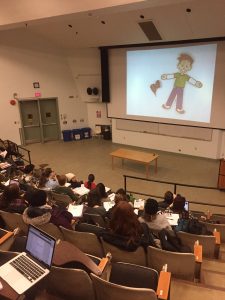 How do bees, trout, and pigs obtain and distribute oxygen throughout their bodies? This course acts as an introduction to animal physiology. It employs a comparative approach to explore how evolution has produced many physiological solutions to the challenges with which animals are faced.
How do bees, trout, and pigs obtain and distribute oxygen throughout their bodies? This course acts as an introduction to animal physiology. It employs a comparative approach to explore how evolution has produced many physiological solutions to the challenges with which animals are faced.
Time (Biol 381)
“Time is the longest distance between two places.”
-Tennessee Williams, The Glass Menagerie
- I conceived and developed this multi-disciplinary team-taught course. It was the winner of the ‘Big Ideas’ competition with the Maple League of Universities. This innovative course brought together the expertise of four professors from four universities to discuss the topic of ‘Time’ from the lenses of four different disciplines. It was offered synchronously across four campuses in three provinces using advanced video-conference technology (see picture above) and provided a unique and contemporary learning experience. Below are some links related to the course:
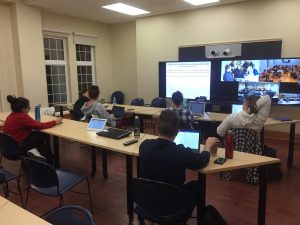 Time is a concept we encounter every day and yet one that we rarely, if ever, consider beyond checking it on our wall clock (or iPhone). However, our seemingly familiar relationship with time deceives us into believing that the concept of time is a simple one. This course will explore the meaning and relevance of time from the perspectives of four different disciplines: religion and culture, physics, biology, and music. It will seek answers to questions such as: What is the meaning of time and how can it be defined? What is the space-time continuum and what does the theory of relativity imply about time? How do organisms perceive time and what is a biological clock? How do different religions and cultures conceive of time? How is time divided to create rhythms and how do we keep a beat?
Time is a concept we encounter every day and yet one that we rarely, if ever, consider beyond checking it on our wall clock (or iPhone). However, our seemingly familiar relationship with time deceives us into believing that the concept of time is a simple one. This course will explore the meaning and relevance of time from the perspectives of four different disciplines: religion and culture, physics, biology, and music. It will seek answers to questions such as: What is the meaning of time and how can it be defined? What is the space-time continuum and what does the theory of relativity imply about time? How do organisms perceive time and what is a biological clock? How do different religions and cultures conceive of time? How is time divided to create rhythms and how do we keep a beat?
Insect Biology (Biol 382)
- I designed and developed this course for StFX University.
This course provides a comprehensive introduction to the extraordinary diversity of insects, and explores key features of insect anatomy, physiology, behaviour, ecology, and classification, integrating appropriate molecular studies throughout. A comparative and evolutionary approach is employed to examine the various adaptations that have allowed insects to become the most successful group of animals on the planet. The numerous ways in which insects impact human life and health are also incorporated throughout. The labs are a key part of this course and are integrated with the lectures.


